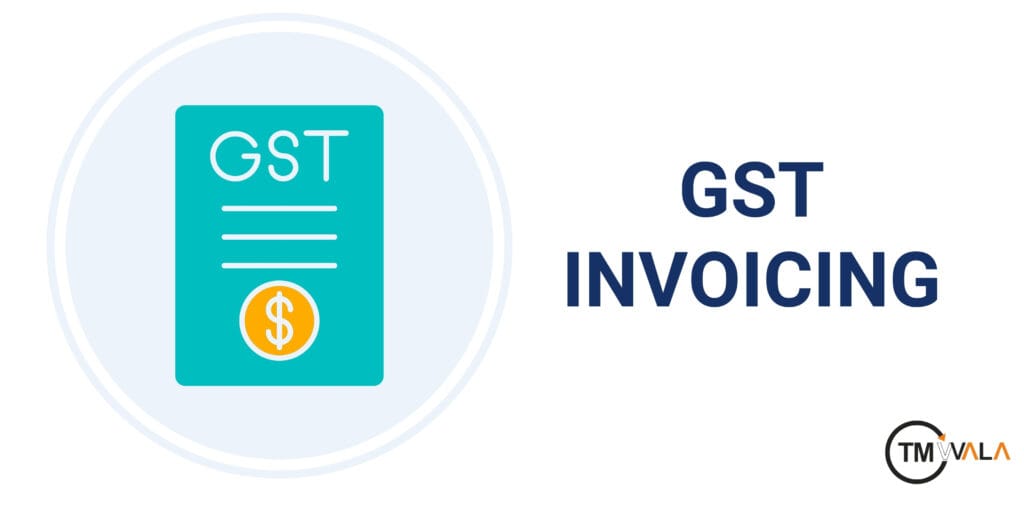Introduction
Regardless of the size or nature of a company, invoicing or billing is an essential function. Since each transaction that is documented through this procedure finds its way into the books of accounts of the company, it is imperative that invoice production be handled carefully. The Goods and Services Tax (GST) has mandated that registered firms issue GST bills, or practice GST invoicing.
A GST invoice needs to be produced whenever a registered taxable person provides taxable goods or services. To be eligible for an Input Tax Credit (ITC), an invoice that complies with GST must be received and issued. Customers forfeit their ITC claims and taxpayers run the risk of losing business if they don’t give such an invoice to taxable registered customers.
GST Invoice
A GST invoice functions as a bill or receipt that a seller or service provider gives for products or services. It lists all of the goods or services rendered, together with the total price owed. The invoice additionally specifies the costs before the imposition of both the State and Central goods and services taxes (SGST and CGST). This guarantees that the taxes paid on each good or service acquired are transparent.
Components of a GST Invoice
A GST invoice plays a crucial role in tax levying and facilitating the Input Tax Credit (ITC) process. It must include several mandatory fields to ensure compliance. These include:
- Issuance by an input distributor
- Inclusion of all supplementary or revised invoices
Additionally, the essential details that a GST invoice must contain are:
- Invoice number: A unique serial number not exceeding 16 digits.
- Invoice date: The date when the invoice is issued.
- Customer name: The name of the customer receiving the goods or services.
- Shipping and billing address: Addresses for both shipping and billing purposes.
- Customer and taxpayer’s GSTIN: The GST Identification Numbers of both the customer and the taxpayer, if registered. (If the recipient is not registered and the invoice value exceeds Rs. 50,000, the invoice should also include the recipient’s name, address, delivery address, state name, and state code.)
- Place of supply: The location where the goods or services are supplied.
- HSN code/SAC code: Harmonized System of Nomenclature or Service Accounting Code for the items or services.
- Item details: A description of the goods or services, including quantity and unit (e.g., meter, kilogram).
- Total value: The overall value of the items or services.
- Taxable value and discounts: The value subject to tax and any applicable discounts.
- GST rate and amount: The applicable rates and amounts for CGST, SGST, or IGST.
- Reverse charge basis: Indication of whether GST is payable on a reverse charge basis.
- Signature: The signature of the supplier or their authorized representative.
Sample of GST Invoice
| Tax Invoice | Date: | ||||||||
| Company Name:GSTIN: | Address: | ||||||||
| Billing Address: | Shipping Address: | ||||||||
| Serial No. | Item Details | HSN | Qty. | Per Item Rate | Total | Discount | Taxable Amt | CGST (9%) | SGST (9%) |
| 1. | A | 5 | Rs.50 | Rs.250 | – | Rs.250 | Rs.22.5 | Rs.22.5 | |
| 2. | B | 7 | Rs.75 | Rs.525 | – | Rs.525 | Rs.47.25 | Rs.47.25 | |
| Total | Rs.775 | Rs.775 | Rs.69.75 | Rs.69.75 | |||||
| Tax Invoice Value (In figures) | Rs.914.50 | ||||||||
| Tax Amount Subject to Reverse Charges | |||||||||
Time Frames for Issuing GST Invoices
Goods Supply:
For goods transactions, a tax invoice should be issued in 3 copies in the following cases:
- For goods in transit: Before or when the goods are dispatched.
- For delivered goods without movement: At the time of delivery to the recipient.
- For ongoing supplies: When issuing an account statement or receiving payment.
Services Supply
For services, the tax invoice must be issued in 2 copies within:
- 30 days from the service provision date.
- 45 days for services provided by insurers, banks, or financial institutions.
Types of Invoices
Bill of Supply
A Bill of Supply is used when GST is not applicable, such as in cases where:
- The seller deals with exempt goods or services.
- The seller is operating under the composition scheme.
Combined Invoice and Bill of Supply
According to Notification No. 45/2017-Central Tax, a single document combining an invoice and a bill of supply can be issued for both taxable and exempt supplies to an unregistered customer.
Aggregate Invoice
For unregistered buyers and when multiple invoices amount to less than Rs. 200, an aggregate invoice can be issued. For example, if the total of several invoices is Rs. 290, a single aggregate invoice may be issued instead.
Reverse Charge Invoice
When tax is paid under the Reverse Charge Mechanism (RCM), the recipient must issue an invoice indicating the RCM tax payment. A payment voucher should also be provided to the supplier.
Debit and Credit Notes
Credit Notes are issued when the invoice amount decreases due to:
- The original invoice showing a higher taxable value.
- The original invoice showing a higher tax amount.
- Goods being returned.
- Services proving to be inadequate.
Debit Notes are issued when the payable amount increases because:
- The original invoice shows a lower taxable value.
- The original invoice shows a lower tax amount.
Conclusion
In a nutshell it is critical for all businesses to comprehend and abide by the rules regarding the issuance of GST invoices. Precise invoicing not only guarantees adherence to tax regulations but also promotes seamless transactions and upholds client confidence. Businesses can improve their operational efficiency and steer clear of potential hazards by making sure all required fields are filled out and by sticking to the deadlines. Clarity and accuracy are essential in any kind of invoice, be it a bill of supplies, a normal tax invoice, or another kind. In the end, paying close attention to these issues enables companies to efficiently manage their tax obligations while cultivating a formal rapport with clients and customers.
Frequently Asked Questions (FAQs)
What should I do if I realize there’s a mistake on a GST invoice after it’s been issued?
If you discover an error on a GST invoice, you should issue a debit note or a credit note to rectify the mistake. This will adjust the taxable value and the tax amount accordingly.
Can I issue a single GST invoice for multiple deliveries of goods?
Yes, you can issue a single GST invoice for multiple deliveries provided the deliveries are to the same recipient and within a reasonable period. However, each delivery must be documented, and the invoice should reflect the total value.
How do I handle GST invoicing for exports?
For exports, you must issue a GST invoice without charging GST if you are exporting under a bond or Letter of Undertaking (LUT). Ensure to mention the export details and the LUT/Bond number on the invoice.
Is it mandatory to sign a GST invoice?
Yes, it is mandatory for the supplier or an authorized representative to sign the GST invoice. The signature can be in physical or digital form.
What are the penalties for non-compliance with GST invoicing requirements?
Non-compliance with GST invoicing requirements can result in penalties. These may include fines for not issuing an invoice, issuing an incorrect invoice, or failing to report the necessary information.
Can I issue an electronic GST invoice?
Yes, electronic GST invoices are permitted and are increasingly common. Ensure that the electronic format meets all the requirements specified under GST laws.
How should I handle GST invoicing for advances received?
When you receive an advance payment for goods or services, you must issue a receipt voucher. Once the supply is made, issue a GST invoice for the full amount, adjusting the advance received.
What is the procedure for cancelling a GST invoice?
To cancel a GST invoice, you need to issue a credit note referencing the original invoice. This credit note will reduce the taxable value and tax amount and must be reported in the GST returns.
How do I issue a GST invoice for services provided over a period of time?
For services provided continuously or periodically, you can issue an invoice at intervals as specified in the contract or on the completion of each event, milestone, or time frame.
What details should I include on a GST invoice for an unregistered customer?
For an unregistered customer, include the customer’s name and address if the invoice value exceeds Rs. 50,000. Ensure all other mandatory fields are completed, but the GSTIN field will be left blank as the customer is unregistered.















